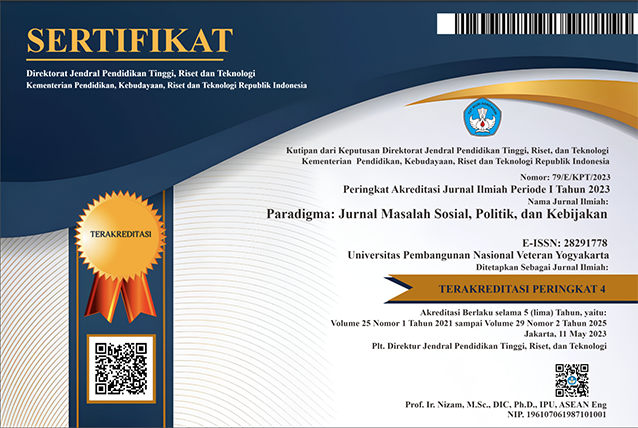Exploring Influential Factors on Online Groceries Shopping Purchase Intentions Among Customers in Jabodetabek Area
DOI:
https://doi.org/10.31315/paradigma.v26i2.7498Keywords:
online grocery shopping, purchase intention, COVID-19Abstract
This study applied a qualitative approach to investigate the underlying influences on consumers’ online grocery shopping from the intention generation phase to intention execution phase in the perspectives of purchase intention and the intention–behaviour gap (IBG). Research data were derived from semi-structured in-depth interviews with 10 consumers and analyzed using grounded theory. The findings identified factors that influenced intentions and the IBG in the process of consumers’ online grocery shopping. Specifically, these findings reported that perceived usefulness, perceived ease of use, perceived risk of COVID-19, social influence, and enjoyable shopping experiences were identified as major drivers for generating consumers’ online purchase intentions. Difficulty in transaction, late delivery, incomplete information, bad packaging, and difficulty with site navigation were factors triggering the gap between online grocery purchase intentions and behaviours These findings will help stakeholders build future policy and suitable strategies to better promote online grocery shopping in the Jabodetabek context.
References
Ajzen, I (2002). The theory of planned behavior. Organ. Behav. Hum. Decis. Process., 50, 179–211.
Anna, Frida & Louise. (2015). Consumer Attitudes Towards Online Grocery Shopping A Research Conducted on Swedish Consumers. Retrieved from http://www.divaportal.org/smash/get/diva2:812884/FULLTEXT01.pdf.
Badan Pusat Statistik. (2022). Perilaku Masyarakat Pada Masa Pandemi Covid-19: Hasil Survei Perilaku Masyarakat Pada Masa Pandemi Covid-19. Diunduh dari https://www.bps.go.id/publication/2022/03/15/5026d1ebbb39697c4d2f280a/perilaku-masyarakat-pada-masa-pandemi-covid-19--hasil-survei-perilaku-masyarakat-pada-masa-pandemi-covid-19.html
Davis, F.D.; Bagozzi, R.P.;Warshaw, P.R. (1989) User Acceptance of Computer Technology: A Comparison of Two Theoretical Models. Manag. Sci., 35, 982–1003.
Gefen, D.; Karahanna, E.; Straub, D.W. (2003). Trust and TAM in Online Shopping: An Integrated Model. MIS Q., 27, 51–90.
Glaser, B.G.; Strauss, A.L. (2007). The Discovery of Grounded Theory: Strategies for Qualitative Research. New York, NY, USA,.: De Gruyter.
Goulding, C. (2000). Grounded theory methodology and consumer behavior, procedures, practice and pitfalls. Adv. Consum. Res., 27, 261–266.
Irawan,W.A.; Yusufianto, A.; Agustina, D.; Dean, R, (2020). Laporan Survei Internet APJII. Diunduh dari https://apjii.or.id/survei (accessed on 17 June 2021).
Jakpat. (2020). Social Distancing During Covid-19 Outbreak - JAKPAT Survey Report. Diunduh dari https://jakpat.net/pdf/23716/social-distancing-during-covid-19-outbreak---jakpat-survey-report
Kim, J.B. (2012). An empirical study on consumer first purchase intention in online shopping: Integrating initial trust and TAM. Electron. Commer. Res., 12, 125–150.
Nguyen-Viet, H.; Tuyet-Hanh, T.T.; Unger, F.; Dang-Xuan, S.; Grace, D. (2017). Food safety in Vietnam: Where we are at and what we can learn from international experiences. Infect. Dis. Poverty, 6, 39.
Rehman, Z.U.; Baharun, R.; Salleh, N.Z.M. (2020). Antecedents, consequences, and reducers of perceived risk in social media: A systematic literature review and directions for further research. Psychol. Mark. 37, 74–86.
Rubin, H.J.; Rubin, I.S. (2004). Qualitative Interviewing: The Art of Hearing Data, 2nd ed.. Thousand Oaks, CA, USA: Sage Publications.
Shin, H.; Kang, J. (2020). Reducing perceived health risk to attract hotel customers in the COVID-19 pandemic era: Focused on technology innovation for social distancing and cleanliness. Int. J. Hosp. Manag., 91, 102664.
Sondakh, J.J. (2017). Behavioral intention to use e-tax service system: An application of technology acceptance model. Eur. Res. Stud. J. 20, 48–64.
Downloads
Published
How to Cite
Issue
Section
License
The manuscript submitted to Paradigma: Jurnal Masalah Sosial, Politik, dan Kebijakan journals are released under the license of Creative Commons Attribution-Non Commercial- ShareAlike (CC BY SA) if and when the article is accepted for publication.
We declare that:
- This paper has not been published in the same form elsewhere.
- It will not be submitted anywhere else for publication prior to acceptance/rejection by this Journal.
- A copyright permission is obtained for materials published elsewhere and which require this permission for reproduction.
Retained Rights/Terms and Conditions
Authors retain all proprietary rights to the published works, such as (but not limited to) the following rights:
- Copyright and other proprietary rights relating to the article, such as patent rights,
- The right to use the substance of the article in own future works, including lectures and books,
- The right to reproduce the article for own purposes,
- The right to self-archive the article
The right to enter into separate, additional contractual arrangements for the non-exclusive distribution of the article's published version (e.g., post it to an institutional repository or publish it in a book), with an acknowledgment of its initial publication in this journal Paradigma: Jurnal Masalah Sosial, Politik, dan Kebijakan



